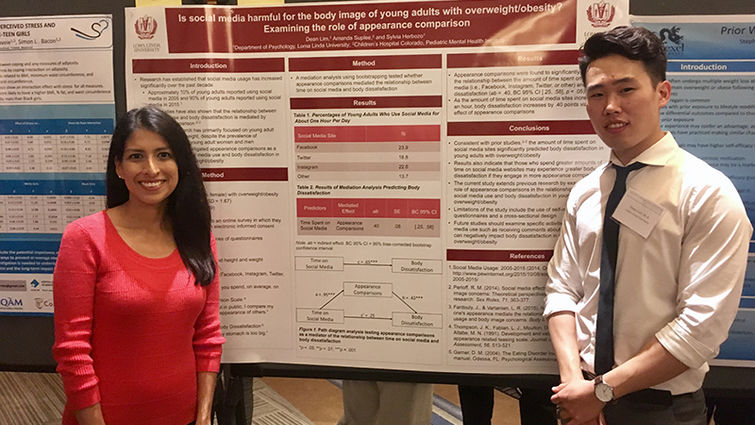
Sylvia Herbozo, PhD, and Dean Lim, MA, share the results of their research into how social media use can impact body image in young adults. Herbozo is an associate professor in the School of Behavioral Health, and Lim is a doctoral student there.
Using social media can be harmful for the body image of young adults with overweight/obesity, according to a study conducted by student and faculty researchers in Loma Linda University School of Behavioral Health’s psychology department.
Dean Lim, MA, a doctoral student, and Amanda Suplee, PhD, a postdoctoral fellow, examined how social media use affects body dissatisfaction in young adults with overweight/obesity, under the supervision of Associate Professor, Sylvia Herbozo, PhD. They surveyed 385 young adult females and males ages 18 to 29 from Midwestern and Southwestern universities. Participants were overweight or obese based on their body mass index. Participants also completed questionnaires about social media use (e.g., Facebook, Instagram, Twitter), appearance comparisons in various settings (e.g., work, party, restaurant), and body dissatisfaction.
Lim and Herbozo presented the study’s results during a March 31 poster session at the Society of Behavioral Medicine’s 2017 Annual Meeting & Scientific Sessions in San Diego, Caliornia. The poster is titled: “Is social media harmful for the body image of young adults with overweight and obesity? Examining the role of appearance comparison.”
Results indicate that approximately 24 percent of young adults with overweight/obesity use Facebook and 23 percent use Instagram for one hour per day on average. Social media use is also directly linked to body dissatisfaction in all participants. Additionally, those who spend more time on social media sites feel more dissatisfied with their body if they make more appearance comparisons in different situations.
“For young adults with overweight/obesity, the amount of appearance comparisons that are made seems to determine the extent to which social media use affects body dissatisfaction,” Lim said.
Previous research suggests social media use is associated with poor body image. Recent studies have demonstrated that comparing one’s physical appearance to that of others seems to play a key role in how social media use influences body image for female adults, regardless of their weight. What is unknown is the mechanism by which social media use has a negative influence on the body image of young adults with overweight/obesity.
The next phase of this research will focus on specific activities during social media use, such as comparing one’s physical appearance to that of others viewed as more attractive and receiving comments about one’s physical appearance. Additional studies are needed to better understand how social media use can negatively impact body dissatisfaction in young adults with overweight/obesity. This research would also help inform prevention efforts to reduce the harmful effects of social media.
